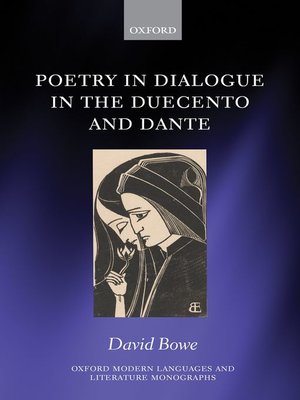Poetry in Dialogue in the Duecento and Dante
ebook ∣ Oxford Modern Languages and Literature Monographs
By David Bowe

Sign up to save your library
With an OverDrive account, you can save your favorite libraries for at-a-glance information about availability. Find out more about OverDrive accounts.
Find this title in Libby, the library reading app by OverDrive.



Search for a digital library with this title
Title found at these libraries:
| Library Name | Distance |
|---|---|
| Loading... |
Poetry in Dialogue in the Duecento and Dante provides a new perspective on the highly networked literary landscape of thirteenth- and fourteenth-century Italy. It demonstrates the fundamental role of dialogue between and within texts in the works of four poets who represent some of the major developments in early Italian literature: Guittone d'Arezzo, Guido Guinizzelli, Guido Cavalcanti, and Dante. Rather than reading the cultural landscape through the lens of Dante's works, significant though they may be, the first part of this study reconstructs the rich network of literary, especially poetic dialogue that was at the heart of medieval writing in Italy. The second part uses this reconstruction to demonstrate Dante's engagement with, and indebtedness to, the dynamics of exchange that characterised the practice of medieval Italian poets. The overall argument—for the centrality of dialogic processes to the emerging Italian literary tradition—is underpinned by a conceptualisation of dialogue in relation to medieval and modern literary theory and philosophy of language. By triangulating between Brunetto Latini's Rettorica, Mikhail Bakhtin's 'dialogism', and as sense of 'performative' speech adapted from J. L. Austin, Poetry in Dialogue shows the openness of its corpus to new dialogues and interpretations, highlighting the instabilities of even the most apparently fixed, monumental texts.







